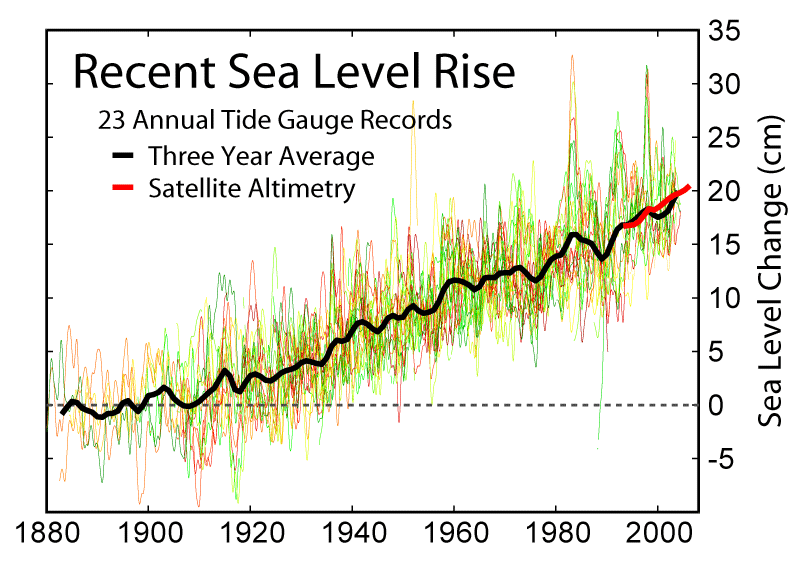
Posted on 02/08/2012 1:28:10 PM PST by grundle

The red line in this image shows the long-term increase in global sea level since satellite altimeters began measuring it in the early 1990s. Since then, sea level has risen by a little more than an inch each decade, or about 3 millimeters per year. While most years have recorded a rise in global sea level, the recent drop of nearly a quarter of an inch, or half a centimeter, is attributable to the switch from El Niño to La Niña conditions in the Pacific. The insets show sea level changes in the Pacific Ocean caused by the recent El Niño and La Niña (see http://sealevel.jpl.nasa.gov/science/elninopdo for more information on these images). Image credit: S. Nerem, University of Colorado
" Actually, not so meaningless. The tectonic plates are in constant motion. Most of the northern (and southern) land masses, which were covered by miles-thick ice sheets, in the last ice age, are still rising. As the continental land masses rise, the plates underneath the oceans could fall, because of the displaced magma. This post ice-age rebound is well documented. It is not the only reason that plates are “rising” or “falling”. (Convection currents in the mantle are probably more important.)
If the ocean were to get deeper (ie the plates underlying the water were to “fall”) then the surface of the ocean would also drop, relative to the centre of the earth.
I'm not saying this is what's happening here — just saying that the original question isn't meaningless.
Here's a link to an interesting graphic on the subject:
“Neither. It’s a hidden alien base sitting at the bottom of the ocean consuming our water.”
I call BS.
It’s all the desalinization plants along the African shorelines producing fresh water for our African brethren. They are using that water to plant crops, grow food, raise animals and feed the continent.
With those plants, they have created economies that have made many people on the continent very wealthy. Poverty has decreased, hunger has decreased and next year they are building the first water park in the Mogadishu suburbs.
This is exciting news.
NASA is run by 20 IQ gnats who couldn’t land a fly on dead meat.
The melting of Himalayan glaciers caused controversy in 2009 when a report from the UN’s Intergovernmental Panel on Climate Change mistakenly stated that they would disappear by 2035, instead of 2350. However, the scientist who led the new work is clear that while greater uncertainty has been discovered in Asia’s highest mountains, the melting of ice caps and glaciers around the world remains a serious concern.
“Our results and those of everyone else show we are losing a huge amount of water into the oceans every year,” said Prof John Wahr of the University of Colorado. “People should be just as worried about the melting of the world’s ice as they were before.”
His team’s study, published in the journal Nature, concludes that between 443-629bn tonnes of meltwater overall are added to the world’s oceans each year. This is raising sea level by about 1.5mm a year, the team reports, in addition to the 2mm a year caused by expansion of the warming ocean.
http://www.guardian.co.uk/environment/2012/feb/08/glaciers-mountains?intcmp=122
That must be along the same lines as “global warming causes it to be colder”.


Sea levels began to rise 18k years ago at the end of the last glacial period. They have risen about 135 meters since then which is an average of 7.5 millimeters per year. That is an average of 750 mm per century (29.5 inches) which is far more than the average over the last century.

From 1880 to 2000 sea level rose about 20 cm or just under 8 inches. Far far less than the nearly 30 inches per century average over the last 18,000 years.
Will Baraq be using this in his 2012 campaign commercials?
Hummm. Warmer water is bigger than cold water. Who would have guessed it?
Given enough obscure indecipherable 'fudge factors' in their equations, they can do most anything. The great thing about math is that you can never run out of numbers.
Engineers on the other hand are tested in real-time. Fudge too much and something either blows up or it falls down.
Disclaimer: Opinions posted on Free Republic are those of the individual posters and do not necessarily represent the opinion of Free Republic or its management. All materials posted herein are protected by copyright law and the exemption for fair use of copyrighted works.